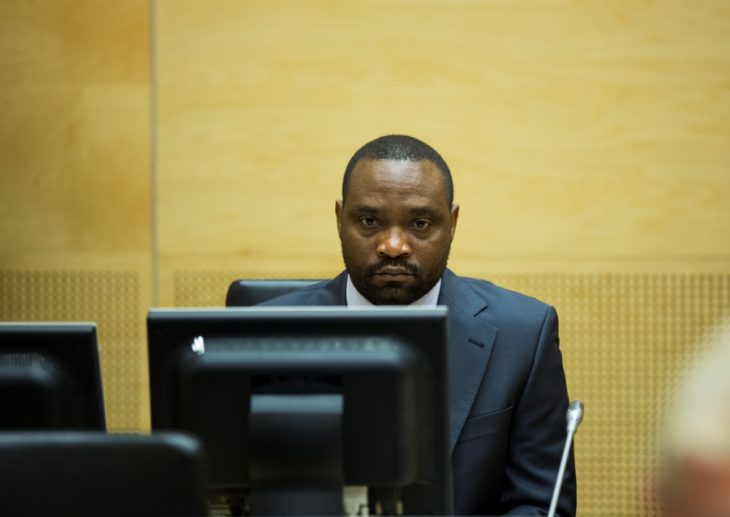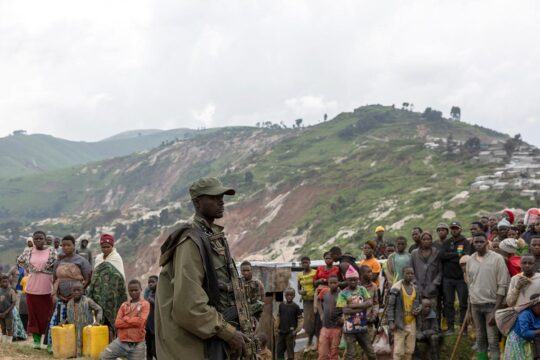Germain Katanga wanted to go back to the Democratic Republic of Congo to rejoin the army or become a farmer, but the judicial authorities have not finished with him. “He will be tried for acts other than those dealt with by the ICC,” says Congolese Justice Minister Alexis Thambwe Mwamba, referring to the International Criminal Court which in 2014 sentenced Katanga to 12 years in jail for war crimes and crimes against humanity.
Germain Katanga, 37, was born in Mambasa, in the Ituri province of northeast DRC. On February 24, 2003, he was accused of involvement in an attack on the village of Bogoro that left 200 people dead. At the time he was commander of the Ituri Patriotic Resistance Forces (FRPI), one of numerous armed groups fighting for control of natural resources (including gold), often on an ethnic basis.
Following a peace accord Katanga, known as “Simba” (meaning lion in Swahili), was promoted in December 2004 to Brigadier general in the Congolese army. In March 2005 he was arrested in Kinshasa after the murder in Ituri a month earlier of nine Bangladeshi UN peacekeepers. He remained in provisional detention until October 2007 but he was not tried. Instead the DRC transferred him to the ICC, which wanted him for war crimes and crimes against humanity committed in Bogoro.
In 2014, the former rebel leader was sentenced to 12 years’ imprisonment and did not appeal. On December 19, 2015, he was transferred at his request from The Hague to finish serving his sentence in the Congolese capital Kinshasa. He was accompanied by Thomas Lubanga, sentenced by the ICC in 2012 to 14 years in jail for recruiting children under 15 and using them to fight in another rebel group in Ituri. Lubanga is set to be released in 2020.
Germain Katanga got his sentenced reduced for good behaviour and for expressing regret to the victims. He was due to leave prison on January 18 but steps have been taken to keep him there.
“We have several cases involving him,” says Justice Minister Thambwe Mwamba. “They include one concerning the UN peacekeepers, but I don’t want to reveal the others because of judicial secrecy during the investigations. We are doing things according to the procedures. He has been informed, and knows he is staying in prison.”
Lawyer Georges Kapimaba, head of the Congolese Association for Access to Justice (ACAJ), told JusticeInfo it is “logical” that Germain Katanga “have the chance to answer before Congolese justice” for alleged crimes other than those tried by the ICC. He says, however, that the government “must refrain from any interference in the said procedures, which we hope will be just and fair”.
So why did the DRC not try Katanga before sending him to the ICC? “The international court wanted him, so we let him go and continued investigating the cases concerning him and other people, and we concluded it is essential that he be heard,” said Alexis Thambwe Mwamba, adding that if Katanga does not have the means to pay for a lawyer “the Bar will assign him a pro bono one”.
The Ituri-based Congolese Association for Respect of Human Rights (ACRDH) told JusticeInfo it does not rule out an ulterior motive. Its executive director Junior Safari wonders if Kinshasa is not trying to “keep Katanga in custody to separate him from his grassroots” because it fears a resurgence [of attacks] by his militia at a time when “there is rising tension in the country owing to the paralysis of the electoral process”.
He also expressed concern for the victims. “Even if he is tried and sentenced, as long as there are no reparations for victims, the sentence will not be worth much,” he said. “The victims expected something concrete from the ICC and nothing was done. It’s not the Congolese authorities who are going to rectify that. Experience shows that no judgment has yet satisfied the victims with regard to reparations.”
On December 23 Human Rights Watch, focusing on the case of the murdered UN peacekeepers, urged the DRC authorities to ensure “a fair and speedy trial” for Katanga and his three co-accused, Floribert Njabu, Sharif Manda and Pierre-Célestin Mbodina, who were “detained arbitrarily for several years before going to The Hague to testify before the ICC” in the Katanga trial. Nearly 18 months after their return to Kinshasa, Human Rights Watch says their situation is “worrying”. “Amended indictments were issued against them in October 2014, but their defence lawyer was not able to gain access to their file until October 2015, when a hearing was scheduled before the High Military Court,” it says. “The hearing did not take place and no new date has been set.
“Important information came out in Katanga’s ICC trial about the role of senior Congolese officials in financing and supporting the militias in Ituri,” states Human Rights Watch. “It’s critical for national proceedings against those who revealed information at the ICC not to turn into a trial based on political vengeance.”






